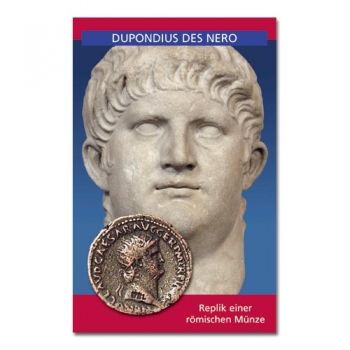Dupondius of Nero - Roman Coins Replica
Dupondius of Nero
Obverse: Head of Nero with radiate crown, with inscription NERO CLAVD(ius) CAESAR AVG(ustus) GER(manicus) P(ontifex) M(aximus) TR(ibunicia) P(otestate) IMP(erator) P(ater) P(atriae) Translation: Nero Claudius (his name), Caesar Augustus (title of emperor), Germanicus (conqueror of the Germanic tribes), Pontifex Maximus (supreme priest), bearer of the official power of a tribune of the people, Imperator (supreme general), Father of the Fatherland (honorary title). The radiant crown of Nero indicates the double value of the ace (2 x ace = Dupondius).
Rev: Helmeted goddess Roma, seated on armour, holding Victoria (goddess of victory) in right hand, left resting on shield, behind her another shield. Circumscription ROMA and S C (Senatus Consulto, coin struck by senate decision).
Minted 65 AD in Rome.
Material: Pewter alloy with patination.
All coin replicas were cast from originals. They are available individually or in various sets.
Surviving prices for the 1st and 2nd century
1 aureus = 25 denarii,
1 denarius = 25 sestertii,
1 sestertius = 2 dupondii,
1 Dupondius = 2 Ass.
A pig costs 75 denarii
"Pecunia non olet!" - Money does not stink
Emperor Vespasian had taken over from his predecessor Nero a state that was almost bankrupt.
Vespasian reorganised the public budgets with great success. His ingenuity in increasing state revenues was great. Among other things, he introduced a tax on public latrines. When his son Titus objected to this, he held some coins from the tax revenue under his nose and asked if this smell bothered him. Titus had to concede that the money did not stink: Pecunia non olet.
The saying has persisted to this day to justify the possession of money from dubious sources of revenue. The public toilets in Paris are still called "Vespasienne" today. In Italy, too, the public toilets are called "Vespasiani".

